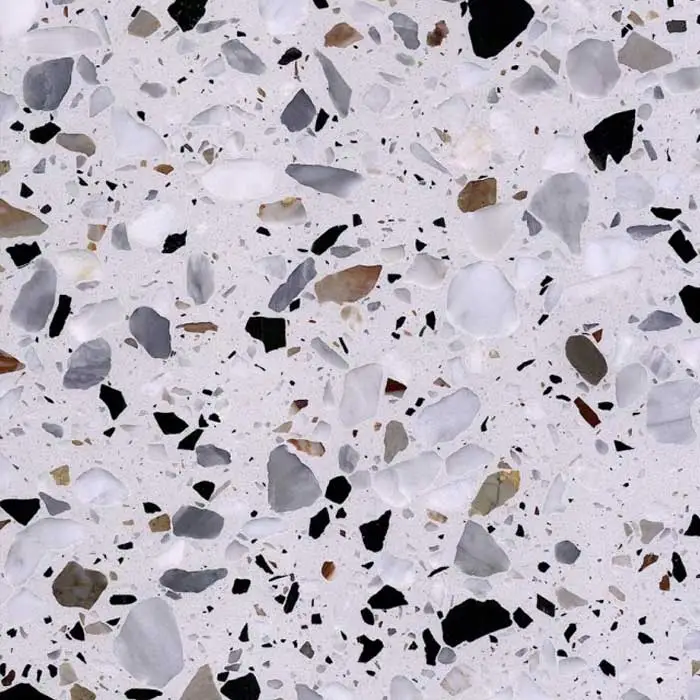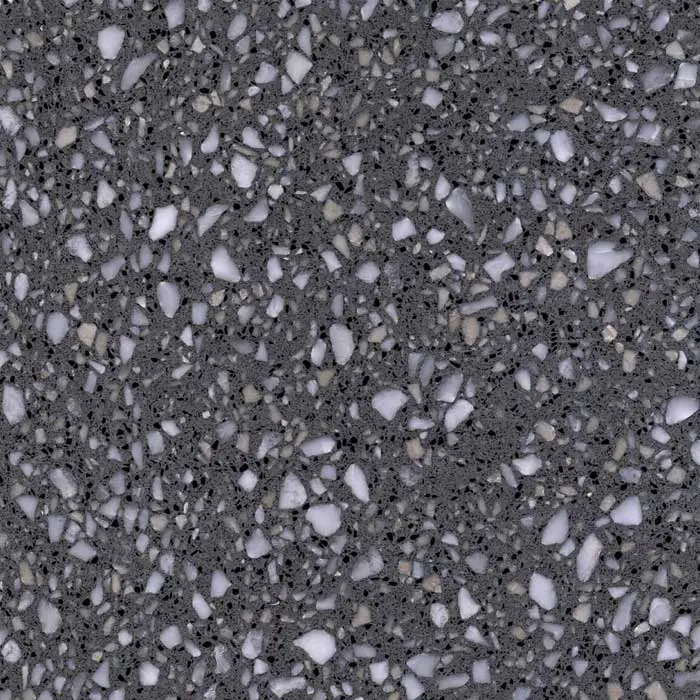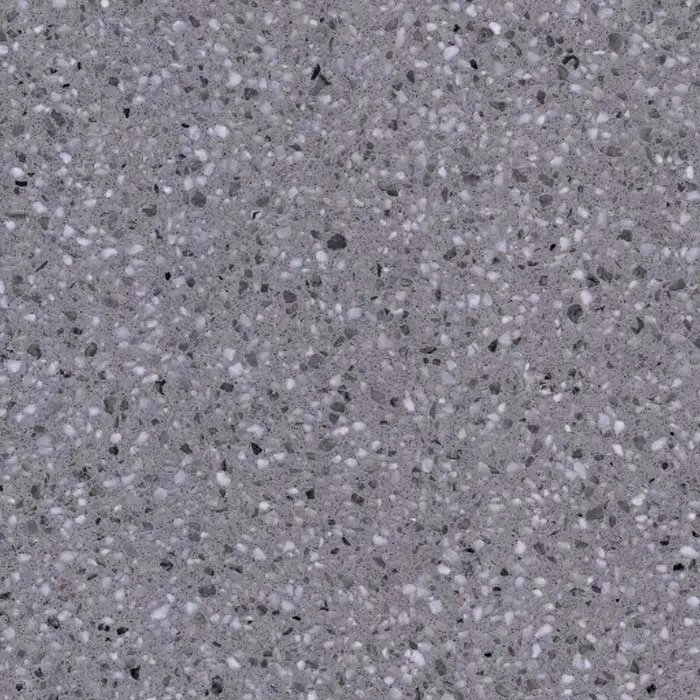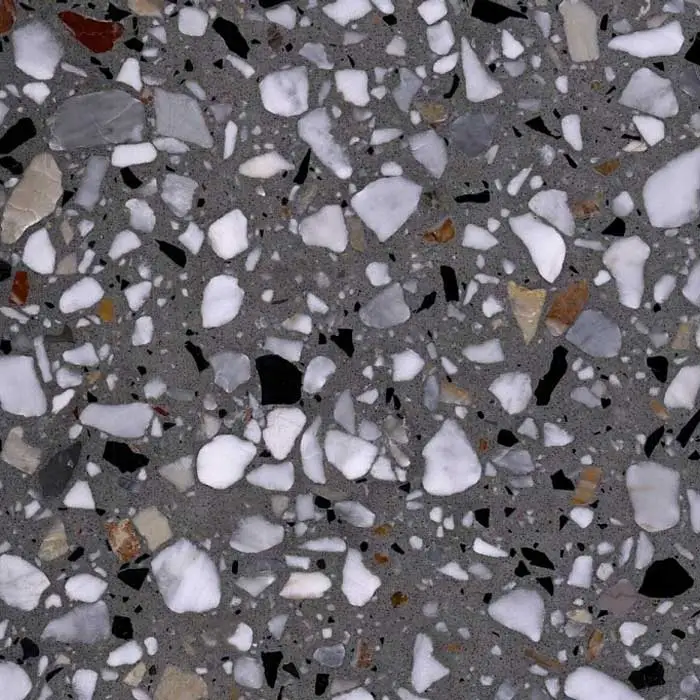Terrazzo stone flooring, as a classic floor decoration material with a long history, has regained favor in architecture and interior design in recent years. It has been widely used in modern homes, commercial spaces and public places due to its unique aesthetic effect, durability and diverse design styles. However, in actual use, many people have doubts about the care, maintenance and durability of terrazzo stone flooring, especially in the use environment of the floor, the placement of items and daily cleaning.
This article will start from the material characteristics of terrazzo stone flooring, and discuss in detail which items cannot be used on terrazzo porcelain floor tiles, and whether terrazzo porcelain floor tiles will fade and other related issues, to help consumers be more handy during installation and use.

What are the characteristics of terrazzo stone flooring?
Terrazzo stone flooring is a decorative floor material made of cement, sand, broken glass, ore, colored stones and other materials mixed and processed by grinding, polishing and other processes. Due to the diversity of its materials, the surface of terrazzo stone flooring often presents rich colors and patterns, which makes it have a unique advantage in aesthetics.
The main components of terrazzo stone flooring are cement and various mineral particles, which are usually natural stone, glass or other colored decorations. Terrazzo stone flooring has high stability in hardness, strong wear resistance, smooth surface and easy to clean. In addition, terrazzo stone flooring also has strong environmental protection performance, because its raw materials are mostly natural minerals, and almost no waste gas is generated during the production process.
However, because the surface of terrazzo stone flooring is composed of different types of mineral particles, its hardness, water absorption, anti-pollution and other properties also have certain differences. Therefore, during use, special attention should be paid to avoid some improper use behaviors to maintain the beauty and service life of terrazzo stone flooring.

What can't be used on terrazzo stone flooring?
During the use of terrazzo stone flooring, there are some items and behaviors that we must avoid to avoid damage to the surface of the floor. Here are some items that should not be used or avoided on terrazzo stone flooring:
1. Strong acidic and alkaline cleaners
The surface of terrazzo porcelain floor tile is usually polished, so the surface is relatively smooth, but not completely non-porous. Using strong acidic or alkaline cleaners may corrode the cement matrix on the floor surface, causing color fading or surface damage. Common strong acidic items include vinegar, lemon juice, etc., while strong alkaline cleaners include cleaners containing sodium hydroxide or ammonia.
Strong acidic or alkaline cleaners will not only destroy the gloss of terrazzo, but may also affect the stability of the mineral particles in it, causing the floor to crack or fall off. In order to ensure the surface gloss and durability of terrazzo porcelain floor tile, neutral detergents or mild cleaning fluids should be used to clean the floor.
2. Oily substances
Terrazzo stone flooring has a certain degree of water absorption, so once oily substances (such as cooking oil, lubricating oil, cosmetics, etc.) penetrate into the floor surface, they may cause long-term stains that are difficult to remove. In particular, long-term accumulated oil stains will not only make the floor surface dirty, but also cause the surface of the terrazzo stone flooring to lose its luster.
Oily substances are easy to adhere to the surface of the floor and penetrate into the cement matrix. Stains that cannot be cleaned for a long time may also cause discoloration of the floor. Therefore, avoiding oily substances from contacting the terrazzo stone flooring is an important step to protect the floor. In the cooking area, if there is oil smoke or oil stains around the terrazzo stone flooring, it is recommended to wipe it with a damp cloth in time and avoid wiping it with oily detergents.
3. Direct contact with high-temperature objects
Although terrazzo porcelain floor tiles have high heat resistance, they still cannot withstand excessively high temperatures. Placing high-temperature objects (such as hot pots and kettles just taken off the stove) directly on the terrazzo porcelain floor tiles can easily cause excessive temperature differences on the floor surface, which in turn causes cracks or local damage. Direct contact of high-temperature objects with terrazzo porcelain floor tiles may also cause the color of the floor to change or the surface gloss to be damaged.
In order to avoid temperature damage to terrazzo porcelain floor tiles, high-temperature objects should be avoided as much as possible from being placed directly on the ground. Using carpets or heat-insulating pads can effectively reduce the direct impact of heat sources on the ground.
4. Frequent friction of heavy objects
Although terrazzo stone flooring has a certain wear resistance, moving heavy objects (such as furniture, home appliances, etc.) on the ground for a long time will cause scratches or wear on the floor surface. If there are hard objects (such as sand) at the bottom of these objects or lack of protection measures, the damage caused by friction is more obvious. Therefore, when moving furniture or heavy objects, it is recommended to use soft pads or protective pads to reduce the damage to terrazzo stone flooring caused by friction.
5. Strong impact or sharp objects
Although terrazzo stone flooring is hard, it is still easy to cause surface damage to sharp objects. If you hit the ground with a sharp knife or hard object, it is easy to leave scratches or cracks on the floor. Therefore, avoid letting heavy objects or sharp objects directly contact terrazzo stone flooring, especially in high-frequency use areas.
6. High humidity environment
Although terrazzo stone flooring has good water resistance, in a long-term high humidity environment, moisture may still penetrate into the tiny pores of the floor, thereby affecting the strength and stability of terrazzo. Excessive moisture may also cause mildew or yellowing on the surface of terrazzo stone flooring, affecting the appearance and service life of the floor. Especially in areas with heavy humidity such as basements or bathrooms, attention should be paid to ventilation and moisture prevention.

Will terrazzo stone flooring fade?
Whether the color and glossiness of terrazzo stone flooring will fade during long-term use is one of the issues that consumers often care about. The fading problem of terrazzo stone flooring is mainly affected by the following factors:
1. Ultraviolet radiation
Although the colored mineral particles in terrazzo porcelain floor tiles are not easily directly destroyed by ultraviolet rays, the long-term accumulation of ultraviolet radiation may cause the color of the terrazzo surface to gradually change, especially some brighter colors. Especially in areas with strong direct sunlight, the surface glossiness of terrazzo porcelain floor tiles may be reduced and the color will become dull.
In order to reduce the impact of ultraviolet rays on terrazzo porcelain floor tiles, curtains or sunshade equipment can be used in places with strong sunlight to avoid excessive ultraviolet radiation.
2. Long-term use and wear
Over time, terrazzo porcelain floor tiles will gradually lose some of their gloss and color due to friction, cleaning and other factors during use. Especially in high-traffic areas (such as corridors, doorways, etc.), the surface wear of terrazzo porcelain floor tiles is more serious, which may cause local fading or unevenness. Therefore, although terrazzo itself is a durable floor material, with long-term use, the surface may have varying degrees of color difference or wear.
In order to delay the occurrence of this fading phenomenon, it is recommended to polish the terrazzo porcelain floor tile regularly to restore its gloss.
3. Improper use of detergents
Improper detergents and cleaning methods may cause fading of terrazzo porcelain floor tiles. Too strong detergents, especially those containing chemical ingredients, may erode the surface of terrazzo, causing the color of the floor to gradually dim or fade. Therefore, choosing a neutral cleaner suitable for terrazzo and following the correct cleaning steps can effectively extend the service life of the floor and reduce the fading problem.
4. Aging of the cement matrix
The color and gloss of terrazzo porcelain floor tile are also closely related to the quality of the cement matrix. If the cement matrix is aged or the construction quality is poor, the floor surface may have color difference or even fade. Therefore, choosing high-quality terrazzo materials and a professional construction team is an important measure to avoid fading problems.

For decades, Foshan Rongguan Glass Material for Building Co., Ltd. has been at the forefront of the building materials industry, known for its durability and design diversity. From stylish artificial marble to robust terrazzo flooring and traditional clay roof tiles, our products cater to residential, commercial, and industrial projects. Our ISO9001:2015-certified factory features over 10 advanced production lines, ensuring that we can handle orders of any size. With competitive prices and bulk discounts, we make quality accessible to everyone. Explore our product range and let Rongguan be your go-to supplier for all your building material needs.

